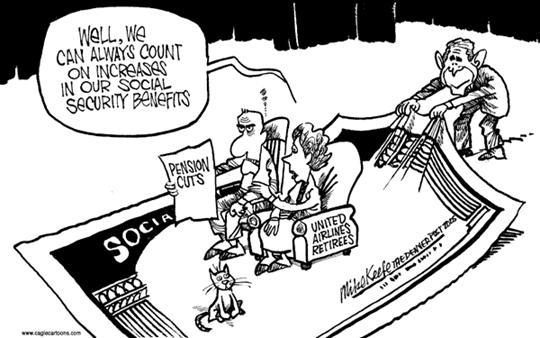|
|
Senate Republicans Deny Social Security Plan Dead
By Susan Cornwell, Reuters
June 16, 2005

Jeff Parker
Senate Republicans acknowledged on Thursday they had no consensus on how to change Social Security after months of trying but denied they were seeking an escape route from the contentious issue.
Senate Finance Committee Chairman Charles Grassley has been holding weekly meetings of the panel's Republicans on restructuring the popular retirement program since President George W. Bush placed it on his agenda last winter.
He said he was determined not to give up.
"If some Republicans are surrendering, Chuck Grassley isn't," Grassley, an Iowa Republican, said in a Capitol Hill hallway during a break in yet another meeting on the issue.
Bush wants to let workers invest a portion of their Social Security taxes in stocks and bonds. But in the face of solid Democratic opposition and some Republican doubts, Republicans have not produced a legislative plan in either the Senate or the House of Representatives.
Democrats say they will not negotiate with Republicans on the underlying issue of shoring up Social Security's finances until private accounts are off the agenda.
Senate Majority Leader Bill Frist, a Tennessee Republican, told reporters he was not looking for an "exit strategy."
But some Republicans who attended Thursday's meeting with Grassley indicated consensus was as elusive as ever. At least one panel Republican -- Sen. Olympia Snowe of Maine -- is firmly opposed to personal accounts and others have expressed concern.
Sen. Orrin Hatch, Republican of Utah, said Thursday's meeting was the first time they had actually discussed the idea of personal accounts.
"There's no easy answer to this," Hatch said of preserving Social Security's long-term solvency. "You either have to cut benefits, or raise taxes, or you got to borrow money. And none of those are very exciting."
Democrats: Plan is dead
Democrats say Bush's personal accounts plan is dead and Republicans should abandon it. On Thursday, Massachusetts Sen. Edward Kennedy said Bush and lawmakers should focus instead on how to resolve a crisis in the funding of corporate pensions, suggesting a bipartisan consensus was more attainable there.
Kennedy said business and labor had a common interest in solving the pension crisis, and Senate Democrats wanted to work with Republicans on an approach that could include letting struggling airlines stretch out payments into pension plans.
"We ought to get about the business of trying to protect workers' pensions," Kennedy said. "There is a real sense of urgency, particularly with regards to the airlines and some of the older, traditional industries."
Grassley, who in addition to the Social Security project is working on legislation to shore up private pensions, also has expressed interest in letting struggling airlines space out payments to pension plans -- although not for the 25 years some airline allies on Capitol Hill have proposed.
One-fifth of U.S. workers, many in older industries, are covered by defined benefit pension plans, with a fixed payout at retirement. But as a group these plans are underfunded.
Bankrupt United Airlines, a unit of UAL Corp. <UALAQ.OB>, has announced it is defaulting on its pensions and handing them over to the Pension Benefit Guaranty Corp., a federal agency. Other airlines have warned they may have to do the same if they are not allowed to space out pension payments.
|
|



